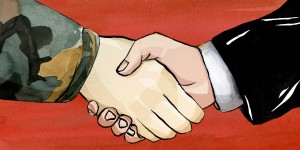By Leah Wawro and Maria Gili, Transparency International’s Defence and Security Programme.
Ministries of Defence and the Armed Forces, often acting in confidentiality and on technically complex issues, are particularly at risk for corruption. It is up to individuals in these institutions to deter corruption with professionalism, integrity, and ethical behaviour, and leaders must provide the guidelines for individual action.
Corruption should matter to defence ministries and armed forces: it means scarce resources are wasted, operational effectiveness is reduced, and public trust in the armed forces and security services is undermined. Defence expenditure on 2010 was USD 1.6 trillion according to SIPRI, which is very close to the whole of India’s and Russia’s respective GDPs, and around 1.3 times Brazil’s GDP
Ten years ago you would have imagined the conversation between defence officials from different countries: ‘Why would we want to deal with codes of conduct and good practice standards publicly, if it would probably bring us trouble?’
We have come a long way since then. Yesterday evening, Transparency International launched a study, Codes of Conduct in Defence Ministries and Armed Forces: What makes a good code of conduct? in London. It was attended by senior defence officials and members of the defence industry from several countries. It is important to get commitment to change at the high levels of government if it is going to happen in practice.
 The report launched yesterday analyses the codes of conduct and standards of 12 countries, including Germany, Kenya, Saudi Arabia and Ukraine, and provides a template of good practice based on those findings.
The report launched yesterday analyses the codes of conduct and standards of 12 countries, including Germany, Kenya, Saudi Arabia and Ukraine, and provides a template of good practice based on those findings.
The report’s major finding is that most countries, Codes of Conduct are not used to ensure defence personnel stick to the rules or assist them to make ethical decision. They do not pay enough attention to corruption issues, and most regimes are ‘compliance’ based, hence, solely legalistic in nature.
Finally, communication, dissemination and training are generally weak. Officers and staff are often given dry, obtuse legal documents when they enter service, but do not receive straightforward, accessible throughout their career so that they know how to behave when individual ethical dilemmas arise.
The two best performers were Australia and Norway, who seem to understand that senior officers and officials in the defence and security sector should be given clear guidance on the behaviour expected of them, and that these standards should be firmly enforced.
In Norway, the highest ranking civil servant of the Ministry of Defence and one of the keynote speakers at our event, General Secretary Erik Lund-Isaksen is involved in making sure this ethical mind-set is stressed on a daily basis. ‘I know that when I visit people in the defence sector, even in the MOD, and I have my Ethical Guidelines paper with me, they say “Oops! Here he comes again. If I feel I’m getting tired of hearing this, it means I’m on the right track.”
Just as the Norwegian approach has proved successful in making the defence mind-set freer of risks of corruption and misbehaviour, the Australians have found their own way to emphasise integrity and ethical behaviour in their defence establishments. Ray Bromwich, the Inspector General for the Australian Department of Defence, believes one of the major factors is the public and media scrutiny. Twice a year their parliament holds public televised committees of enquiry into the use of resources for that financial year.
This report built on a 2008 report on the same subject, titled ‘Ethics and Business Conduct in Defence Establishments: The Improvement of National Standards’.
Four years ago Transparency International’s Defence and Security programme asked 60 countries to provide information on their codes of conduct and ethical standards. We received written codes of conduct and supporting documents from 32: a sign that ethics has gone from an issue to avoid, to a subject to address, and engage with civil society.
The attendance by national defence ministry and armed forces personnel at our launch shows that this engagement is increasing.















 Connect with us on Facebook
Connect with us on Facebook Follow us on Twitter
Follow us on Twitter